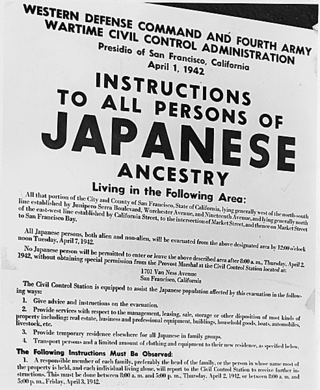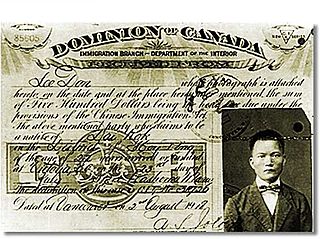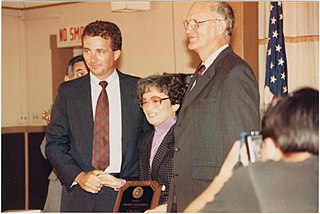Related Research Articles

Executive Order 9066 was a United States presidential executive order signed and issued during World War II by United States president Franklin D. Roosevelt on February 19, 1942. "This order authorized the force removal of all persons deemed a threat to national security from the West Coast to "relocation centers" further inland- resulting in the incarceration of Japanese Americans." Two-thirds of them were U.S. citizens, born and raised in the United States.

The War Measures Act was a statute of the Parliament of Canada that provided for the declaration of war, invasion, or insurrection, and the types of emergency measures that could thereby be taken. The Act was brought into force three times in Canadian history: during the First World War, Second World War, and the 1970 October Crisis.

Events from the year 1940 in Canada.

Camillien Houde was a Quebec politician, a Member of Parliament, and a four-time mayor of Montreal. He is of the few Canadian politicians to have served at all three levels of government.

The Chinese Head Tax was a fixed fee charged to each Chinese person entering Canada. The head tax was first levied after the Canadian parliament passed the Chinese Immigration Act of 1885 and it was meant to discourage Chinese people from entering Canada after the completion of the Canadian Pacific Railway (CPR). The tax was abolished by the Chinese Immigration Act of 1923, which outright prevented all Chinese immigration except for that of business people, clergy, educators, students, and some others.

From 1942 to 1949, Canada forcibly relocated and incarcerated over 22,000 Japanese Canadians—comprising over 90% of the total Japanese Canadian population—from British Columbia in the name of "national security". The majority were Canadian citizens by birth and were targeted based on their ancestry. This decision followed the events of the Japanese Empire's war in the Pacific against the Western Allies, such as the invasion of Hong Kong, the attack on Pearl Harbor in Hawaii, and the Fall of Singapore which led to the Canadian declaration of war on Japan during World War II. Similar to the actions taken against Japanese Americans in neighbouring United States, this forced relocation subjected many Japanese Canadians to government-enforced curfews and interrogations, job and property losses, and forced repatriation to Japan.

The Civil Liberties Act of 1988 is a United States federal law that granted reparations to Japanese Americans who had been wrongly interned by the United States government during World War II and to "discourage the occurrence of similar injustices and violations of civil liberties in the future". The act was sponsored by California Democratic congressman and former internee Norman Mineta, Wyoming Republican senator Alan K. Simpson and California senator Pete Wilson. The bill was supported by the majority of Democrats in Congress, while the majority of Republicans voted against it. The act was signed into law by President Ronald Reagan.

Italian Canadians comprise Canadians who have full or partial Italian heritage and Italians who migrated from Italy or reside in Canada. According to the 2021 Census of Canada, 1,546,390 Canadians claimed full or partial Italian ancestry. They comprise a subgroup of Southern European Canadians which is a further subgroup of European Canadians. The census enumerates the entire Canadian population, which consists of Canadian citizens, landed immigrants and non-permanent residents and their families living with them in Canada. Residing mainly in central urban industrial metropolitan areas, Italian Canadians are the seventh largest self-identified ethnic group in Canada behind French, English, Irish, Scottish, German and Chinese Canadians.
Massimo Pacetti is a Canadian politician from Quebec, Canada. Pacetti was first elected to the House of Commons of Canada in a 2002 by-election and continued as the Member of Parliament for Saint-Léonard—Saint-Michel sitting with the Liberal caucus until 2014; he served his last year of office as an Independent MP.

The Ukrainian Canadian internment was part of the confinement of "enemy aliens" in Canada during and for two years after the end of the First World War. It lasted from 1914 to 1920, under the terms of the War Measures Act.
The internment of Italian Americans refers to the government's internment of Italian nationals in the United States during World War II. As was customary after Italy and the US were at war, they were classified as "enemy aliens" and some were detained by the Department of Justice under the Alien and Sedition Act. But in practice, the US applied detention only to Italian nationals, not to US citizens, or long-term US residents. Italian immigrants had been allowed to gain citizenship through the naturalization process during the years before the war, and by 1940 there were millions of US citizens who had been born in Italy.
Arthur Kazumi Miki, is an activist and politician in Winnipeg, Manitoba, Canada. He was president of the National Association of Japanese Canadians from 1984 to 1992, and is best known for his work in seeking compensation for Japanese-Canadians who were interned by the Government of Canada during World War II.
The following article focuses on the movement to obtain redress for the internment of Japanese Americans during World War II, and significant court cases that have shaped civil and human rights for Japanese Americans and other minorities. These cases have been the cause and/or catalyst to many changes in United States law. But mainly, they have resulted in adjusting the perception of Asian immigrants in the eyes of the American government.

Internment of German resident aliens and German-American citizens occurred in the United States during the periods of World War I and World War II. During World War II, the legal basis for this detention was under Presidential Proclamation 2526, made by President Franklin Delano Roosevelt under the authority of the Alien Enemies Act.
Nisei is a Japanese-language term used in countries in North America and South America to specify the ethnically Japanese children born in the new country to Japanese-born immigrants. The Nisei are considered the second generation, and the grandchildren of the Japanese-born immigrants are called Sansei, or third generation.

Japanese American history is the history of Japanese Americans or the history of ethnic Japanese in the United States. People from Japan began immigrating to the U.S. in significant numbers following the political, cultural, and social changes stemming from the 1868 Meiji Restoration. Large-scale Japanese immigration started with immigration to Hawaii during the first year of the Meiji period in 1868.
The Pacific Citizen (P.C.) is a national, award-winning semi-monthly newspaper based in Los Angeles, California, United States. The P.C. has been providing the leading Asian Pacific American (APA) news to the community since its inception in 1929. The newspaper is published by the Japanese American Citizens League, JACL, which is the nation’s oldest and largest APA civil rights organization.
Italian Canadian internment was the removal and internment of Italian Canadians during World War II following Italy's June 10, 1940, declaration of war against the United Kingdom. Through the War Measures Act, the government of Canadian Prime Minister William Lyon Mackenzie King gave itself the power to suspend habeas corpus, revoke rights, seize property and arrest those who were deemed a threat to the safety of Canada—labelling 31,000 Italian Canadians as "enemy aliens". Between 1940 and 1943, between 600 and 700 Italian Canadian men were arrested and sent to internment camps as potentially dangerous "enemy aliens" with alleged fascist connections. In the decades that followed, political apologies were made for the internment of Italian Canadians.
William Minoru Hohri was an American political activist and the lead plaintiff in the National Council for Japanese American Redress lawsuit seeking monetary reparations for the internment of Japanese Americans during World War II. He was sent to the Manzanar concentration camp with his family after the attack on Pearl Harbor triggered the United States' entry into the war. After leading the NCJAR's class action suit against the federal government, which was dismissed, Hohri's advocacy helped convince Congress to pass legislation that provided compensation to each surviving internee. The legislation, signed by President Ronald Reagan in 1988, included an apology to those sent to the camps.

Cherry Kinoshita was a Japanese American activist and leader in the Japanese American Citizens League (JACL). She helped found the Seattle Evacuation Redress Committee and fought for financial compensation for Japanese Americans who had been incarcerated during World War II.
References
- ↑ "Dante St.: Heart of Little Italy thrives as 'a family place'," Montreal Gazette, 11 July 1987, p. 2; "Climbing the ladder of success ... and working towards a united Canada," Toronto Star, 4 June 1992, p. 8.
- ↑ "Italian Benevolent Corp. exceeds 'wildest expectations'," Toronto Star, 4 June 1992, p. 24; Jeff Heinrich, "Italian groups set aside rivalries to promote election in homeland," Montreal Gazette, 29 April 2005, p. 6; "The NCIC appoints new members to its executive team" [press release), National Congress of Italian Canadians - Quebec Chapter, 18 April 2011, accessed 22 September 2011.
- ↑ "Italian Canadians plan to lobby for redress," Toronto Star, 6 January 1990, p. 16.
- ↑ "Italians drop bid for wartime compensation," Canadian Press, 28 November 1994; "Italian Canadians want apology for internment," Canadian Press, 4 March 1997.
- ↑ "Italians seek new apology from Canada for wartime internments". The Globe and Mail. 30 April 2010.
- ↑ Third Session, Fortieth Parliament, House of Commons, Bill C–302 [ permanent dead link ] Retrieved January 2, 2011. (pdf file)
- ↑ "Apology to interned Italian-Canadians questioned".
- ↑ "Redress and Apology". www.italiancanadianww2.ca.
- ↑ Paul Wells, "Greek, Italian and Jewish groups launch plan for united Canada," Montreal Gazette, 27 November 1996, p. 11.
- ↑ Jeff Heinrich, "Italian groups set aside rivalries to promote election in homeland," Montreal Gazette, 29 April 2005, p. 6.
- ↑ Hugh Winsor, "Faith in finding the ring," Globe and Mail, 30 December 1980, p. 7; "Ministers bring range of experience to cabinet," Ottawa Citizen, 2 October 1990, p. 5; "Italian Canadian group criticizes compensation plan," Toronto Star, 29 May 1993, p. 18.
- ↑ "National Congress of Italian Canadians fonds description at Library and Archives Canada" . Retrieved November 14, 2022.
{{cite web}}: CS1 maint: url-status (link) - ↑ "Finding Aid of National Congress of Italian Canadians fonds" (PDF). Retrieved November 14, 2022.
{{cite web}}: CS1 maint: url-status (link)